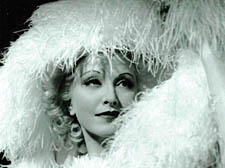|
|
 |
| |

Frances Day in the 1935 film, Oh Daddy |
Star of West End Frances staged a disappearing act
‘Gone away’: As centenary songs collection is released,
mystery of 1930s cabaret idol remains
AT the height of her fame, Frances Day was the darling of the West End cabaret scene – a peroxide femme fatale who had the cream of 1930s society eating from her palm.
But as she reached her zenith, the Mayfair star decided to bring down the curtain on her glittering career, change her name and claim that Frances Day was actually her own mother, in what remains one of the most bizarre mysteries in show business history. Entering what would have been her centenary year, which has been marked by the release of a new collection of her songs, the reasons for the strange episode remain unclear.
When the Australian impresario Beaumont Alexander spotted a 16-year-old Frances Schenk, dancing in a notorious New York speakeasy in 1924, he proclaimed her “the ultimate in sex appeal” and brought her to London to unleash on the West End.
After some teething problems, most notably her New Jersey drawl, the rebranded Frances Day exploded as a musical star, appearing in a run of hit shows to an adoring public.
Following an acrimonious split with Alexander, whom she married at just 19, Miss Day wooed a string of society faces including the then Prince of Wales and Britain’s Foreign Secretary, soon to be Prime Minister, Anthony Eden, making her the most talked about woman in England.
Speaking of the bombshell’s allure, her friend and fellow actor Sir John Mills said: “She was devastatingly attractive, and, as I discovered later on, when I was in a show with her, the men in the audience simply couldn’t take their eyes off her.”
Miss Day’s fame rocketed after the war as she made the crossover to television, appearing as a panellist on What’s My Line and hosting the hit radio series The Name’s the Same.
But it was when her lesbian lover, the screenwriter Moie Charles, was found gassed in her Chelsea flat, that things started to go awry.
In 1965, starring in her final West End play, The Gulls, opposite Bob Monkhouse, she demanded to be billed as Frankie, claiming that Frances had been her mother.
Not content with that, the star went further underground, selling her Mayfair home of 30 years in Kings Yard and changing her name by deed poll to Samta Young Johnson.
She evaded her close friends Sir John Mills and Sir Frederick Ashton and buried her past for 20 years until she died aged 76 in her unassuming Maidenhead flat in 1984. She never revealed her true identity.
When her fortune and entire estate was left to her neighbour, Howard McBrien, he was dumbfounded.
Mr McBrien was even more amazed when he found out that the reclusive enigma and his benefactress had been Frances Day.
Scrawled in messy handwriting, the will instructed: “There be no notice or information of any kind of my death, except for and if a death certificate is obligatory.
“Any persons, private or press, you shall simply say that I am no longer at this address. Gone away. Destination unknown.”
•
Frances Day: Golden Girl of the 1930s £6.99 from www.avidgroup.co.uk |
 |
|
| |
| |
|
 |
|








